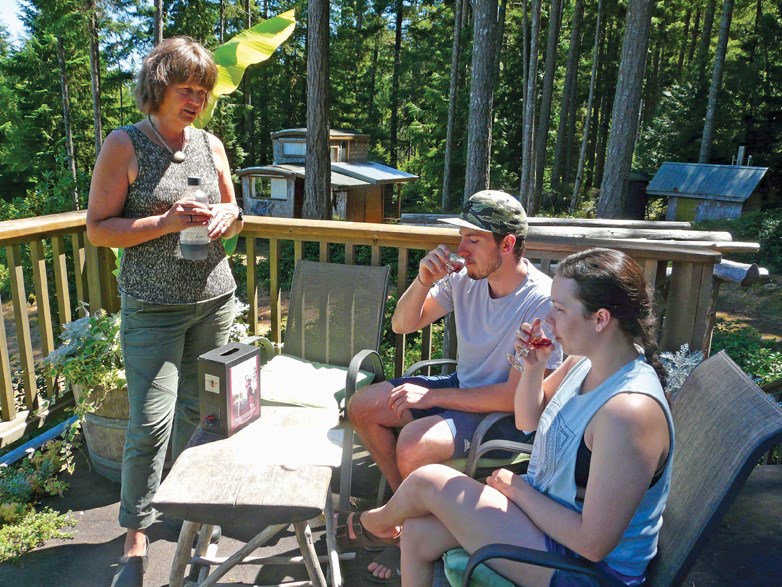Nearly all of British Columbia’s Gulf Islands have sizable creative communities – crafts-folk producing pots and paintings, bowls and embroideries. On Hornby Island, whose winter population of 1,000 swells to five times that in July and August, much of this output is on display in a charming summer market set up in the woods. But here the artisanal gene extends further, to libations: a winery, a fruit winery, a distillery and a meadery.
That’s a remarkable number of liquor makers for such a small community, but only the last item is truly unusual. While even distilleries have become rather common in the past decade, a meadery is still a rare beast.
Middle Mountain Mead is down two dusty gravel roads, through a forest of fir and cedar trees. Helen Grond, a geologist by training, started it in 2005 on three-and-a-half hectares she and her then-partner bought in the 1990s. Grond had been planting herbs, especially lavender, which she sold at the local market, and was looking for other ways to make use of her crops. Her research led her to mead.
“A drink I took of the magick mead,” says Odin, chief of the Norse gods, in Runahal, a saga written in 1220, “and then I began to know and to be wise, to grow and to weave poems.”
Mead, made from fermented honey, was the drink of the gods – not just the Norse ones, but of Greek, Celtic and non-European deities too, Grond learned. There were many different types, including a category called metheglin (Welsh for medicinal liquor), which used herbs – just what Grond was looking for.
Today, Middle Mountain makes nine meads, whose alcohol content ranges from 12 to 20 per cent. From Wednesday to Sunday throughout the summer (1 to 5 p.m.), visitors can sample them at the on-site tasting room, sipping while seated on a large deck looking north across the Strait of Georgia to Texada Island.
Either Grond or her husband, Steve McGrath, is usually on hand to pour and explain. You might start with Cyser, a cider-like apple-honey wine that was the first thing they made, continue on to the Mead of Inspiration, Grond’s favourite and their closest product to red wine, and, if you’re lucky, conclude with Rosemeade, made from rose petals and similar to ice wine.
Along the way, your pourer will tell you what you’re drinking. The Mead of Inspiration, for example, has more than 30 ingredients including 10 herbs, some with “mildly psychotropic effects,” says Grond. Green Tea Elixir can be heated like saki and contains stinging nettle and ginger, which have healing properties. Grond says that alcohol is a much better solvent than water for releasing the active ingredients of herbs.
Middle Mountain only makes about 6,500 litres of mead a year. Aside from the tasting room, its products are available at private liquor stores in B.C., and Grond can ship across Canada (but not internationally). Have they had any orders from, say, the Lethbridge Druid Society, wanting to consecrate a new ring of standing stones? Not yet, she says.
For more information, see www.middlemountainmead.com
More stories at www.culturelocker.com



